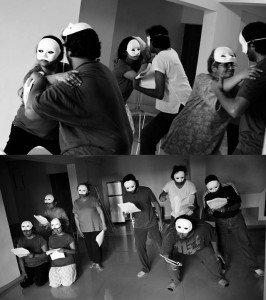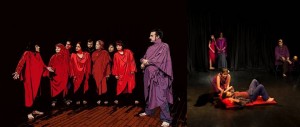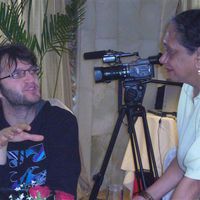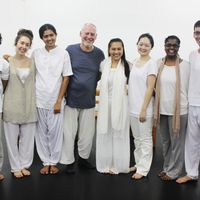The Bangalore Lysistrata Project: Indo-British Theatre Collaboration
 Contributed by Deepika Arwind
Contributed by Deepika ArwindWe are a group of nine Indian actors sitting on stage. Our British director, Jeff Teare takes the centre seat of the first row. We are trying to access his thick British accent and he is trying to understand the group’s mixed pronunciation of English words. The question we are considering is how to pronounce the name of the play we are about to begin rehearsing and which will open the season for Jagriti Theatre, a year-old theatre space in Bangalore, Are we going to call it Lie-sis-trata or Lis-is-trata? The question is quickly, easily and efficiently resolved, like most things in the production are about to be. Jeff calls the shots: it will be Lis-is-trata.
Lysistrata is a 2,500-year-old play written by Aristophanes, about a woman who seeks to end the endless war between Athens and Sparta with a radical strategy that the women of both sides employ: no sex for the men until they put a stop to the war. The comedy reinforces many gender stereotypes and has several “double entendres” about sex, but it comes from a time when only men watched and performed plays. Nevertheless, Aristophanes can be called a progressive playwright for writing a play with a woman protagonist laying out an unorthodox plan in the pursuit of peace.
Yet the actors are wondering what relevance this play might have in an urban context at this moment in time. According to Jeff, the play has a strong resonance in contemporary times: war is an ongoing issue, and the actors agree with him.
To bring Lysistrata closer home, Jeff gets the actors to add references to familiar locations, landmarks and people to his more general adaptation of the play. The names of the Athenians and the Spartans, the two warring parties, do not change, though. The actors do not seem to object to its mixed form, mainly because the language of play is far removed from the Aristophanes original. Jeff has used slang and common parlance to lessen the distance between the actors and the text, which seemed to be the key to letting them inhabit the text more fully.
As for the Bangalore references, I feel that the play could have done without them altogether, or we could have set the play in a fictional space and time. However, it was in fact these references that really hooked the audience, who responded to them with expressions of delight or laughter. I think one of the reasons Jeff chose to go with this kind of ‘adaptation’ was because he was already battling the idea of working with actors from another country and it seemed to him that they would own the text more easily if the play was set here, at home.
[caption id="attachment_21248" align="alignnone" width="266" caption="The rehearsal: Actors go beyond 'just acting' with mask-work and a percussion workshop"]
 [/caption]
[/caption]We begin to draw up rehearsal schedules and create a professional working atmosphere. Theatre is still to grow into a viable profession in India. Actors are usually professionals working in other sectors doing theatre part-time. Even full-time actors work on a play-to-play basis, sometimes with no guarantee of payment. Unsurprisingly, therefore, unless actors are part of a repertory company, their levels of commitment vary as does the professionalism with which they approach their theatre work.
Jeff, having done a couple of projects in Bangalore previously, is familiar with the working circumstances of actors here. In the UK there exists ample private and state infrastructure to support theatre, and professionalism is taken as a given. He tries to enforce the same kind of work ethic here. We're under contract, we're paid, and our first priority is to be present for rehearsal whenever we are called, whatever our other commitments. For this particular production, we're a repertory working for Jagriti Theatre. This is a new experience for most actors here, even those who have worked in theatre for a long time. Jeff imposes a rigorous practice that is alien to our culture of theatre. We work full days, except weekends. We have fixed working hours and fixed breaks. Apart from process-related issues, we take all other queries to our stage manager, who sits through every single rehearsal and is aware of everything that takes place in any session. It is also a pleasant change that we’re able to rehearse in the performance space itself.
All through the six weeks of rehearsal we wonder: “Does it take a white person to create a system like this?” We are not sure. Yes, it does seem to take someone from a different context to shake us up. It helps that Jagriti has made this cross-cultural collaboration possible. It also takes a special kind of 'foreign' director to maintain professionalism while creating a sense of ease amongst the team.
Jeff makes the process as interesting as he can for the actors. He brings with him cultural expressions from different parts of the world, some of which we use in the play, like simple foot movements from Uganda to help us keep rhythm. He knows each of us has a different warm-up routine, so he teaches us Chi Kung, an ancient Chinese form of aligning breath and movement similar to Tai Chi, to create a common drill and enable us to begin thinking and behaving like a repertory. At one point we suddenly notice the coming together of several cultural elements on one stage: a group of Indian actors, under the guidance of a British director, doing the Chinese Chi Kung to a Tamil song in a rehearsal for a Greek play!
[caption id="attachment_21368" align="alignnone" width="300" caption="The performance: Lysistrata enjoys 18 continuous shows in India (Photo credit: Studio Kriti)"]
 [/caption]
[/caption]Working on Lysistrata gives us an insight into what a stage experience for actors can entail if they’re doing more than just acting. And beyond everything else, we are able to do 18 continuous shows of the play. It isn't common for a show in India to have such a long run, but the model that Jagriti has chosen to adopt, based on theatre models in the UK, allows for it.
Lysistrata receives mostly praise, but some harsh criticism as well. As an actor in the production, however, what stays with me is not the audience response. Nor am I driven to think just about what Jeff brought to the process, but rather what is possible to do with a theatre space, a committed cast and crew, and a singularly-focused theatre practice.
Deepika Arwind is a writer and performer based in Bangalore. She has acted in several theatre productions over the past five years, and has worked with children and young adults as a theatre facilitator and teacher. She also writes for the theatre section of TimeOut Bangalore. Her poetry and short-fiction has been published in national and international magazines and journals. She won the Toto Award for Creative Writing in 2011, and was also awarded the Lavanya Sankaran fellowship for an international writing residency, Sangam House, in January 2011.
Similar content
posted on
15 Jun 2010
30 Sep 2015 - 13 Mar 2016
posted on
14 Oct 2014





